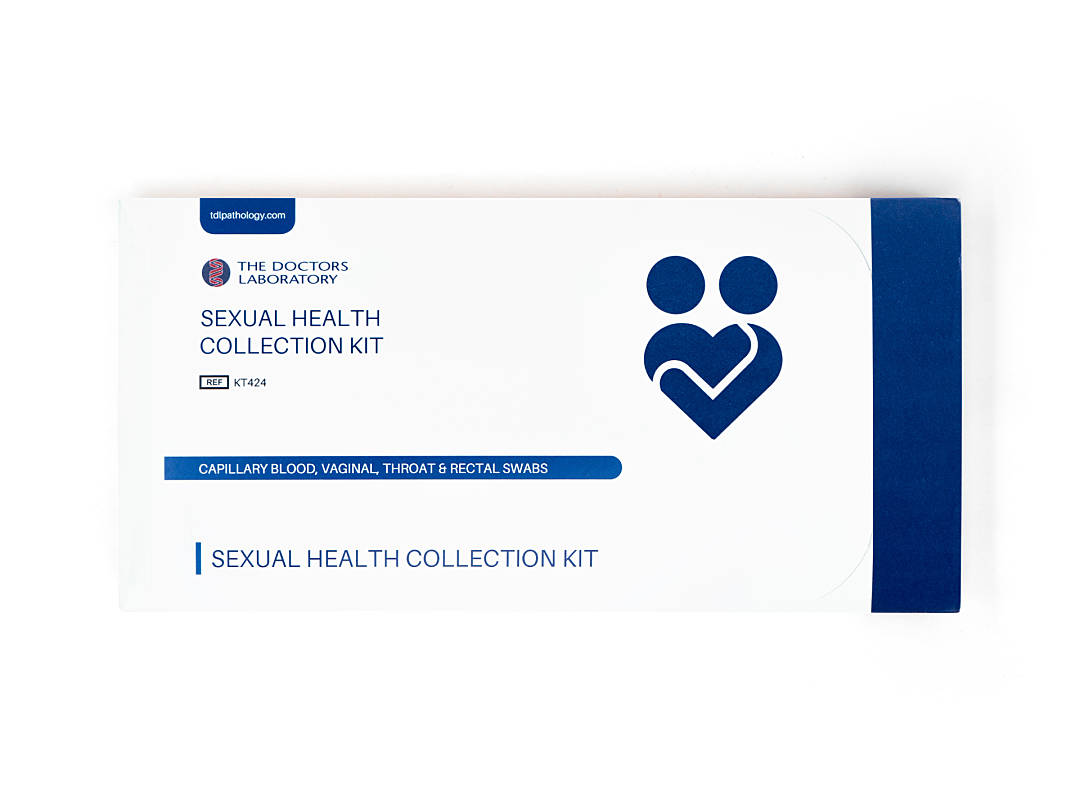-
An extended STI test kit can check for a range of sexually transmitted infections (STIs). If you aren’t sure what you’ve been exposed to or have symptoms that aren’t specific to just one STI, you can order an extended STI home test kit. The test covers common STIs, including those that often have no symptoms, such as chlamydia and gonorrhoea.
Each infection has a different incubation period, which is how long it takes before it shows on an extended STI test. It’s best to wait until after the incubation period to order a complete STI test unless you get symptoms, so you can get the most accurate results.



-
-
An extended STI test kit can detect a range of STIs, including:
- chlamydia
- gonorrhoea
- mycoplasma
- herpes
- trichomoniasis
- gardnerella vaginalis
- ureaplasma
Our extended home STI test kit can be used by all genders to test for the above infections. You’ll need to do a urine sample or take a swab of your genitals, then send your sample to a lab for testing.
An extended STI test is recommended if you:
- don’t know what you’ve been exposed to
- have had unprotected sex with a new partner
- have symptoms that don’t apply to just one STI, as many STIs have similar symptoms
What are symptoms covered by the extended STI test kit?
STI symptoms can vary depending on the STI, but the extended STI test kit can be used if you notice any symptoms. Common symptoms of STIs include:
- burning, itching, or irritation of the genitals
- pain when peeing
- unusual discharge
- bleeding between periods
- a rash on or around the genitals
- blisters, sores, or lumps around the genitals
- pain, discomfort, or bleeding during or after sex
These can appear anytime within a few days to a few weeks after infection. For some STIs, it may take longer for symptoms to show, if at all. In rare cases, you can get symptoms within 48 hours.
What does the extended STI test kit cover?
A range of the most common STIs are covered in the extended test kit, including those most tested for in the UK. Below we look at each STI in more detail and how the test kit detects the infection.
Chlamydia
This is the most common STI in the UK and is usually symptomless, which is one of the main reasons it spreads undetected. If you do get symptoms, this may include pain when peeing, unusual discharge, or bleeding after sex.
Chlamydia is caused by the bacteria Chlamydia trachomatis. A chlamydia test can detect this bacteria through a vaginal swab or urine sample.
If you think you’ve been exposed to chlamydia specifically, you can order a chlamydia test kit. If you test positive, you can order chlamydia treatment online as well.
Gonorrhoea
Gonorrhoea is the second most common STI in the UK and is also caused by bacteria. Most people don’t get symptoms, but if you do, this includes pain when peeing and unusual discharge. The test kit will detect the bacteria either with a swab or a urine sample.
Herpes
Genital herpes is caused by the herpes simplex virus, which also causes cold sores. It can lay dormant for a long time, without causing symptoms or being detected on a STI test. You should only test for herpes with the extended STI test if you have blisters or sores on or around the genitals, as this is the only way to get an accurate result.
Asda Online Doctor offers:
Mycoplasma
Mycoplasma is not commonly known, but is an STI caused by a parasitic bacterium, which can affect you regardless of gender. It’s often symptomless but men are more likely to get symptoms, such as pain in the testes, needing to pee more frequently or a burning sensation when peeing. The test kit can identify the bacteria through a swab or urine sample.
Ureaplasma
Ureaplasma is caused by a bacteria that is commonly found in the genitals and other parts of the body. When the bacteria overgrows, it can lead to infection. Many people have ureaplasma with no symptoms, but if you do, this usually affects your urinary tract.
You may notice pain when peeing or need to pee more frequently. The STI test kit will detect the bacteria through a swab or urine sample.
Gardnerella vaginalis
Gardnerella vaginalis affects people with vaginas more often, but anyone can get it. This infection is commonly called bacterial vaginosis or BV. It’s caused by a change in bacteria in the vagina, with typical symptoms such as itching, white discharge, and a strong-smelling discharge.
This isn’t an STI, but it can be spread through sex and sex can trigger it. As it’s caused by bacteria, the test can detect it through a vaginal swab or urine sample.
Trichomoniasis
Trichomoniasis is caused by a parasite, which can be detected with a swab or urine sample. Around 50% of people with trichomoniasis have no symptoms, and it is more common to cause symptoms in women, such as watery discharge and pain when peeing.
-
-
Every STI has an incubation period and this is how long it takes to cause symptoms (if any) and show up on an STI test. If you have symptoms, you should get tested straight away. If you have no symptoms, it’s best to wait at least 2 weeks to get tested, but this depends on the infection.
STI screening: frequency and importance for different risk profiles
If you’re under the age of 25, it’s recommended to get tested annually, or whenever you’ve had sex with a new or casual partner without a condom. The highest rates of common STIs like chlamydia are among those under 25, which is why it’s recommended to get tested often.
If you are bisexual, gay or are a man who has sex with men, you should test for HIV once a year, or every 3 months if you didn’t use a condom with a new or casual partner. This is because HIV risk is higher for those who have anal sex, as the lining of the rectum is thin, which increases the risk of HIV entering the body.
You can order an HIV test kit from Asda Online Doctor.
-
-
ASDA Online Doctor offers a confidential and secure service if you’re looking for how to test for an STI. Choose the test kit that’s right for you, such as the extended STI screening kit, complete a short online form to place your order and get your kit delivered to your door.
Your kit comes with detailed instructions on how to take your samples. Once you’ve completed your test kit, you can send your sample to our partner and your results will be available in your account 2 to 3 days after your sample reaches the lab.
What are the benefits of an at-home extended STI test?
Advantages to getting an STI kit online include:
- no need to travel
- no need for a face-to-face with a doctor or nurse
- no need to book an appointment in advance
- take your sample any time, not just during GP office hours
- fast results with in-depth advice
- direct access to a doctor any time through your patient account
How to buy an extended STI test kit online?
You can buy an extended STI self-test kit through ASDA Online Doctor, which is a simple and speedy process:
- complete a brief medical questionnaire, which includes listing any symptoms (although you don’t need to have symptoms to order)
- log in to your account or create one if it’s your first time using Asda Online Doctor
- one of our team will check your order
- if it’s approved, your chosen STI test kit will be sent to your home or chosen address in discreet packaging
- the kit will include everything you need to take the test and a pre-paid label to send it to our labs
-
-
When you order an STI test kit online it will arrive packaged with instructions included. If you have a vagina, you’ll need to take a vaginal swab. If you have a penis, you’ll need to collect a urine sample.
Below is a step-by-step guide to using the extended STI home test kit if you’re doing a vaginal swab:
- Wash your hands thoroughly before using the kit. Make sure to complete the test on a flat surface.
- Remove the swab from the packet and avoid touching anything with the cotton end.
- Swab the inside of your vagina by inserting it about 5cm deep, gently rotating the swab for around 15 seconds.
- Remove the swab and insert it into the sample tube, snapping off the excess at the black line.
- Close the sample tube and wash your hands.
- Attach any labels and write down any important information that the kit asks for, such as the date of the sample.
- Package everything in the box or envelope provided and attach the pre-paid label.
- You can put your kit in a post box or visit any Royal Mail branch.
- Your results will be ready to view in your online account around 2 to 3 days after the lab receives it.
Below is a step-by-step guide to using the extended STI home test kit if you’re doing a urine sample:
- Wash your hands thoroughly before using the kit. Make sure to complete the test on a flat surface.
- When you next need to use the bathroom, pee into the sample tube until it reaches the full line. If you overfill it, just pour a little bit out and clean up the bottle.
- Close the sample tube and wash your hands.
- Attach any labels and write down any important information that the kit asks for, such as the date of the sample.
- Package everything in the box or envelope provided and attach the pre-paid label.
- You can post your kit through a post box or by visiting any Royal Mail branch.
- Your results will be ready to view in your online account around 4 to 5 days after the lab receives it.
-
-
This depends on each STI, and results from studies are as follows:
- both chlamydia and gonorrhoea tests are greater than 97% accurate
- trichomoniasis testing is 99-100% accurate
- Gardnerella vaginalis tests are 90 - 95% accurate
- herpes is 98% accurate if symptoms are present
- Mycoplasma testing is between 99.1% and 98.5% accurate
- ureaplasma urine sample tests are 96% accurate and vaginal swabs are 95.1% accurate
Taking the test properly and at the right time will improve accuracy. Studies have also found that there’s no difference in accuracy between doing a test at home or your GP or sexual health clinic. Using a combined test or an individual one shouldn’t affect the results.
-
-
Ordering the extended STI test kit through ASDA Online Doctor takes as little as 5 minutes. Your test can be sent out the same day if you choose next-day delivery. Taking the test takes a few minutes, as the process is the same whether you’re testing for multiple STIs or only one.
If you take a test with the NHS, you need to wait for a GP appointment or visit a walk-in at your local sexual health clinic. Walk-ins can be busy and it may be difficult to get to one around work or education commitments. Some clinics only run walk-in sessions a few times a week.
-
-
Your extended STI test results will be available on your online portal around 2 to 3 days after the lab receives your sample. You will get a positive or negative result for each STI. This will tell you which infections you have – the positive results. You’ll also get information on what to do next from one of our doctors if you’ve tested positive.
How to interpret the extended STI test kit results?
A positive result means you have an infection and one of our doctors will let you know the next steps.
A negative result means you do not have an infection at the time of the test, as long as you didn’t take it too early (sooner than 2 weeks after unprotected sex).
What a positive result means for you depends on which infection you’ve got:
- chlamydia, trichomoniasis or mycoplasma – you’ll need treatment to clear up the infection
- gonorrhoea – you’ll need treatment from a local sexual health clinic
- ureaplasma or gardnerella vaginalis – you can get treatment but you may not need it if you have no symptoms
- herpes – there’s currently no cure for herpes, so you may get another outbreak in the future, but you can get treatment to prevent or shorten your outbreaks
See our ‘What are the STI treatments?’ section for more details on treatments you might need.
How long do extended STI test results take?
Extended STI test results usually take 2 to 3 days once your sample has reached the lab. NHS tests can take anywhere from 1 to 2 weeks to get results, making an at-home test potentially quicker.
-
-
After a positive extended STI test result, you should:
- get treatment
- let your sexual partner(s) know, as they should get tested too
- avoid having sexual intercourse or oral sex until you have finished treatment and are no longer infectious
- if you do have sex, use protection to prevent further infection
Any advice you need on treatment and next steps is available for free with our service. You can message one of our doctors through your account once you’ve got your results.
What are the STI treatments?
Different STIs require different forms of treatment. In most cases it’s antibiotics.
Antibiotics work by stopping bacteria from multiplying and help your immune system to get rid of the infection. Treatment options for each STI tested for in the test kit are as follows:
- chlamydia treatment – an antibiotic called doxycycline, which is taken twice every day for a week
- gonorrhoea treatment – an antibiotic injection at your local sexual health clinic, followed by tablets
- trichomoniasis treatment – metronidazole (an antibiotic), which is taken twice a day for 5 to 7 days
- ureaplasma treatment – doxycycline, an antibiotic which is taken twice a day for 1 week
- mycoplasma treatment – a course of 2 different antibiotics called doxycycline, which is taken for 7 days, then azithromycin, which is taken for 3 days
- herpes treatment – antiviral medications like aciclovir, valaciclovir, or famciclovir can be used to treat an outbreak, the length of your course depends on whether this is your first outbreak but is usually between 3 and 10 days
- Gardnerella vaginalis – metronidazole tablets and gel or clindamycin cream, which are both antibiotics
If you don’t test positive for herpes but have sores or warts on your genitals, you may need to test and then get genital warts treatment.
-
-
STIs are sexually-transmitted infections, which can sometimes have lasting implications if not treated. Many STIs have no symptoms, making frequent testing important if you have unprotected sex, change partners, or have casual partners. Complications from untreated STIs include infertility and birth defects.
What is an STI?
STIs are infections that are usually spread through sexual intercourse or sexual contact. They may also be spread through infected blood or genital fluids, such as HIV. You can get an STI in your genitals, throat, anus, or bloodstream.
STIs are caused by bacteria, parasites or viruses. Most won’t go away on their own, which means you need treatment.
How long does STI last after treatment?
Most STIs will go away once your treatment course has ended (so within 1 to 2 weeks), but some STIs require further treatment or are more difficult to get rid of.
Herpes is the only STI covered by the extended test kit that is a permanent infection. This means you will always have the virus but it will only cause an outbreak every now and again, or you may only ever get one outbreak. An outbreak happens when you get symptoms, so for herpes, this would be genital sores.
What is the difference between STD and STI?
STD stands for sexually transmitted disease, while STI means sexually transmitted infection. People are usually talking about the same thing when they use these terms, but they do mean different things.
An infection is the invasion of a virus, bacteria or parasite into your body, which may cause symptoms and complications – but not always. A disease always causes health complications. This is why the term was changed and you’ll no longer find ‘STD’ on the NHS website.
-
Frequently asked questions
How many days do you take antibiotics to treat STIs?
This depends on the STI, but is usually between 7 to 10 days.
Can you have an STI for life?
Most STIs clear up once you’ve taken treatment, but a few STIs are not curable. This includes genital herpes (although you won’t always have symptoms) and HIV.
Can you get an STI if both partners are clean?
If both you and your partner have tested negative for all STIs and neither of you has had sex with another partner since testing, you cannot get an STI unless one of you received a false negative result (one of the tests showed negative even though you or your partner had an infection).
The main way to get an STI is to have sex with another person who has not tested negative for all STIs after having sex with someone else. Some STIs, like herpes, can be passed on by skin-to-skin contact even when you’re not having sex. If you get symptoms of an STI, you and your partner should get tested.
STI tests are very accurate when taken at the right time, but in rare cases you can get a false negative. If you take an STI test less than 2 weeks after unprotected sex, you may not get accurate results.
Should I get tested after every partner?
It’s recommended to get tested after every new partner, especially if you had unprotected sex. This can help keep you and future partners safe from an undetected STI. You should also get tested regularly if you’re sleeping with partners who themselves are sleeping with other people, even if they aren’t a new partner to you.
What is the best antibiotic for STI?
Each STI may be treated with a different antibiotic, so this depends on what you test positive for. Antibiotics are generally effective in treating STIs caused by bacteria although some infections can be resistant to certain antibiotics. There are often backup treatments available if the first course of antibiotics doesn’t clear up your infection. The most common first-line treatment for many STIs is doxycycline.

Babak studied medicine at King’s College London and graduated in 2003, having also gained a bachelor’s degree in Physiology during his time there. He completed his general practice (GP) training in East London, where he worked for a number of years as a partner at a large inner-city GP practice. He completed the Royal College of GPs membership exam in 2007.
Meet our doctorsLast reviewed: 28 Aug 2023
-
Gov.uk (2022). Getting tested for an STI: Your guide to how it works: https://ukhsa.blog.gov.uk/2022/10/05/getting-tested-for-an-sti-your-guide-to-how-it-works/, retrieved 23/08/2023
-
Gov.uk (2023) Sexually transmitted infections and screening for chlamydia in England: 2022 report: https://www.gov.uk/government/statistics/sexually-transmitted-infections-stis-annual-data-tables/sexually-transmitted-infections-and-screening-for-chlamydia-in-england-2022-report, retrieved 23/08/2023
-
National Library of Medicine (2014). Screening for Gonorrhea and Chlamydia: Systematic Review to Update the U.S. Preventive Services Task Force Recommendations: https://www.ncbi.nlm.nih.gov/books/NBK248303/, retrieved 15/08/2023
-
NHS (2021). Chlamydia: https://www.nhs.uk/conditions/chlamydia/, retrieved 15/08/2023
-
NHS (2021). Gonorrhoea: https://www.nhs.uk/conditions/gonorrhoea/, retrieved 15/08/2023


GMC: 7074021

GMC: 6149061

GMC: 7085115

















